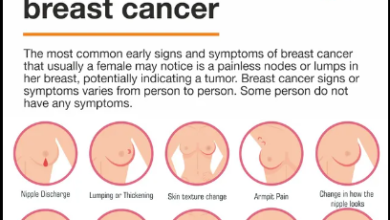What Is Breast Cancer?

What Is Breast Cancer?
Introduction: Breast cancer is a prevalent and impactful disease that affects both women and, although less commonly, men. It occurs when cells in the breast undergo abnormal growth and division, forming a lump or mass. This article aims to provide a comprehensive understanding of breast cancer, covering its types, causes, symptoms, diagnosis, treatment options, coping mechanisms, prevention, recent research advancements, and the importance of awareness.

Types of Breast Cancer:
- Ductal Carcinoma In Situ (DCIS): DCIS is a non-invasive cancer where abnormal cells are found in the lining of a breast duct but haven’t spread outside.
- Invasive Ductal Carcinoma (IDC): IDC is the most common type, characterized by cancer cells that invade nearby tissues in the breast.
- Invasive Lobular Carcinoma (ILC): ILC begins in the milk-producing glands and can spread beyond the lobules.
- Triple-Negative Breast Cancer (TNBC): TNBC lacks receptors for estrogen, progesterone, and HER2, making it more challenging to treat.
- HER2-Positive Breast Cancer: This type overproduces the HER2 protein, promoting the growth of cancer cells.
Causes and Risk Factors: Breast cancer risk factors include genetic predisposition, hormonal influences, and lifestyle choices like diet and physical activity.
Signs and Symptoms: Detecting breast cancer early is crucial. Watch for changes in breast appearance, nipple changes, or any pain and discomfort.
Diagnosis and Screening: Regular mammograms, biopsies, and genetic testing contribute to early detection and accurate diagnosis.
Treatment Options: Treatment may involve surgery, radiation therapy, chemotherapy, hormone therapy, or targeted therapy, depending on the type and stage of breast cancer.
Coping with Breast Cancer: Emotional support and survivor stories highlight the resilience of individuals facing breast cancer.
Breast Cancer Prevention: Adopting a healthy lifestyle, undergoing regular screenings, and seeking genetic counseling are key preventive measures.
Advances in Breast Cancer Research: Immunotherapy and personalized medicine represent promising developments in breast cancer treatment.
The Importance of Awareness: Breast Cancer Awareness Month and educational initiatives play a vital role in promoting early detection and treatment.
Real Stories of Triumph: Personal narratives inspire hope and showcase the strength of those who have overcome breast cancer.
FAQs:
- How common is breast cancer? Breast cancer is the most common cancer in women globally, with millions diagnosed each year.
- Can men get breast cancer? Yes, although rare, men can develop breast cancer, usually affecting older individuals.
- What role does genetics play in breast cancer? Genetic factors can contribute, and individuals with a family history may have a higher risk.
- Are there alternative treatments for breast cancer? Complementary therapies may assist, but evidence supporting alternative treatments is limited.
- How can I support a loved one diagnosed with breast cancer? Offer emotional support, accompany them to appointments, and educate yourself about their treatment.
Conclusion: Breast cancer is a complex disease with various types and treatment options. By fostering awareness, encouraging regular screenings, and supporting ongoing research, we can collectively contribute to early detection and improved outcomes for those affected by breast cancer.




